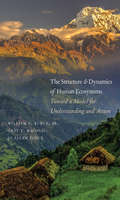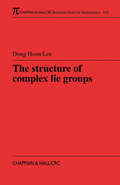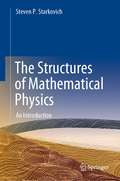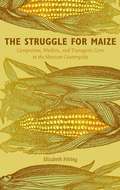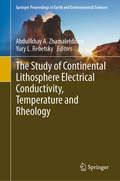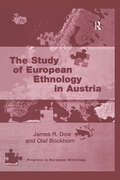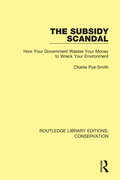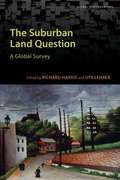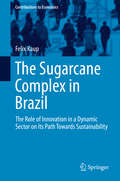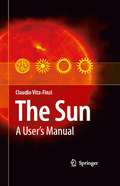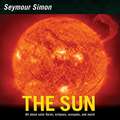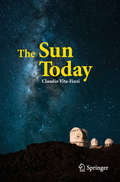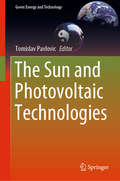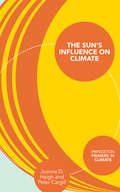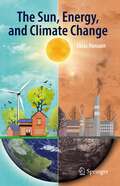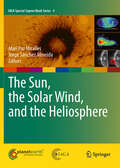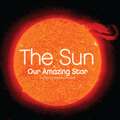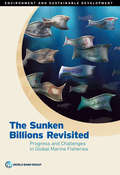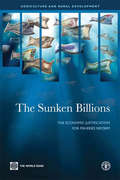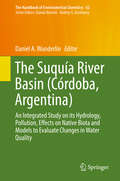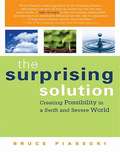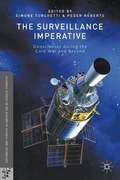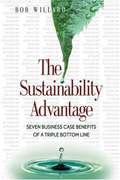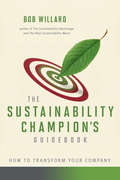- Table View
- List View
The Structure and Dynamics of Human Ecosystems: Toward a Model for Understanding and Action
by William R. Burch Gary E. Machlis Jo Ellen ForceA landmark book that strives to provide both grand theory and practical application, innovatively describing the structure and dynamics of human ecosystems As the world faces ever more complex and demanding environmental and social challenges, the need for interdisciplinary models and practical guidance becomes acute. The Human Ecosystem Model described in this landmark book provides an innovative response. Broad in scope, detailed in method, at once theoretical and applied, this grand study offers an in-depth understanding of human ecosystems and tools for action. The authors draw from Goethe’s Faust, classic anthropology and sociology studies, contemporary ecosystem ecology, Buddhist ethics, and more to create a paradigm-shifting model and a major advance in interdisciplinary ecology.
The Structure of Complex Lie Groups (Chapman & Hall/CRC Research Notes in Mathematics Series)
by Dong Hoon LeeComplex Lie groups have often been used as auxiliaries in the study of real Lie groups in areas such as differential geometry and representation theory. To date, however, no book has fully explored and developed their structural aspects.The Structure of Complex Lie Groups addresses this need. Self-contained, it begins with general concepts
The Structures of Mathematical Physics: An Introduction
by Steven P. StarkovichThis textbook serves as an introduction to groups, rings, fields, vector and tensor spaces, algebras, topological spaces, differentiable manifolds and Lie groups --- mathematical structures which are foundational to modern theoretical physics. It is aimed primarily at undergraduate students in physics and mathematics with no previous background in these topics. Applications to physics --- such as the metric tensor of special relativity, the symplectic structures associated with Hamilton's equations and the Generalized Stokes's Theorem --- appear at appropriate places in the text. Worked examples, end-of-chapter problems (many with hints and some with answers) and guides to further reading make this an excellent book for self-study. Upon completing this book the reader will be well prepared to delve more deeply into advanced texts and specialized monographs in theoretical physics or mathematics.
The Struggle for Maize: Campesinos, Workers, and Transgenic Corn in the Mexican Countryside
by Elizabeth FittingWhen scientists discovered transgenes in local Mexican corn varieties in 2001, their findings intensified a debate about not only the import of genetically modified (GM) maize into Mexico but also the fate of the peasantry under neoliberal globalization. While the controversy initially focused on the extent to which gene flow from transgenic to local varieties threatens maize biodiversity, anti-GM activists emphasized the cultural significance of the crop in Mexico and demanded that campesinos and consumers have a voice in the creation of GM maize and rural policies. In The Struggle for Maize, Elizabeth Fitting explores the competing claims of the GM corn debate in relation to the livelihood struggles of small-scale maize producers, migrants, and maquiladora workers from the southern Tehuacn Valley. She argues that the region's biodiversity is affected by state policies that seek to transform campesinos into entrepreneurs and rural residents into transnational migrant laborers. While corn production and a campesino identity remain important to an older generation, younger residents have little knowledge of or interest in maize agriculture; they seek out wage labor in maquiladoras and the United States. Fitting's ethnography illustrates how agricultural producers and their families respond creatively to economic hardship and Mexico's "neoliberal corn regime," which promotes market liberalization, agricultural "efficiency," and the reduction of state services over domestic maize production and food sovereignty.
The Study of Continental Lithosphere Electrical Conductivity, Temperature and Rheology (Springer Proceedings in Earth and Environmental Sciences)
by Abdullkhay A. Zhamaletdinov Yury L. RebetskyThis proceedings book investigates the possibilities for creating new models of the continental lithosphere structure by integrating methods from geothermodynamics and deep geoelectrics. It particularly focuses on the use of powerful controlled sources of electromagnetic field to study the nature of deep geophysical boundaries. It also presents research related to the transition boundary between the brittle and quasiplastic states of Earth’s crust matter and the position of creep areas in Earth’s crust, as well as geothermal and rheological studies in combination with the deep electromagnetic soundings – a promising direction that allows the tectonophysical reconstruction of natural stresses in the lithosphere. The experimental study results and tectonophysical modeling are discussed in the context of the Fennoscandinavian shield, the Indian Craton, the Himalayas, Eastern Tibet and the Eurasian continent as a whole. The book appeals to researchers interested in solid Earth physics.
The Study of European Ethnology in Austria (Progress in European Ethnology)
by James R. Dow Olaf BockhornThe study of ethnology or ’Volkskunde’ in Austria has had a troubled past. Through most of the 20th century it was under the influence of the so-called Viennese ’Mythological School’ and the controversy between the two opposing branches, the ’Ritualist’ and the ’Mythologists', set much of the agenda from the 1920s until long after the World War ended in 1945. The volume examines two Austrian characters, Richard Wolfram and Karl Haiding, and the impact of their research and sets them in the context of Austrian ethnology before, during and after the war years. The book concludes by examining the present day ethnological outlook in the country.
The Subsidy Scandal: How Your Government Wastes Your Money to Wreck Your Environment (Routledge Library Editions: Conservation #7)
by Charlie Pye-SmithOriginally published in 2002, The Subsidy Scandal examines the subsidies spent by governments and the affect this has had on the environment. The book examines industries ranging from agriculture to mining, energy to transport and the subsidies spent on these industries by government. The book argues that these industries have had a negative impact on the environment, often funded through government subsidies derived from public taxes. The book suggests that these subsidies go to those who least need them – frequently to corporations and special interest groups which recycle some of the funds to support the politicians who keep the subsidies going. Based on research in North America, with examples from Europe and elsewhere, the book provides an investigative report into to the money assigned to environmental policies to find out where the money goes and what produces it.
The Suburban Land Question: A Global Survey (Global Suburbanisms)
by Richard Harris Ute LehrerAs part of the urbanization process, suburban development involves the conversion of rural land to urban use. When discussing the suburbs, most writers focus on particular countries in the northern hemisphere, implying that patterns and processes elsewhere are fundamentally different. The purpose of The Suburban Land Question is to identify the common elements of suburban development, focusing on issues associated with the scale and pace of rapid urbanization around the world. Editors Richard Harris and Ute Lehrer and a diverse group of contributors draw on a variety of sources, including official data, planning documents, newspapers, interviews, photographs, and field observations to explore the pattern, process, and planning of suburban land development. Featuring case studies from major world regions, including China, India, Latin America, South Africa, as well as France, Austria, the Netherlands, the United States, and Canada, the volume identifies and discusses the peculiarly transitional character of suburban land. In addition to place and time, The Suburban Land Question addresses the many elements that distinguish land development in urban fringe areas, including economy, social infrastructure, and legality.
The Sugarcane Complex in Brazil
by Felix KaupThis book offers an in-depth analysis of the Brazilian sugarcane complex with a special focus on technological advances that promote sustainable development. It first examines the question why sugarcane-based ethanol from Brazil is considered a superior alternative to fossil fuel compared to other biofuels produced on an industrial scale and subsequently analyzes the most dynamic areas within the sugarcane sector with regard to relevant actors, technologies and markets in order to determine if the sector can be considered an innovation system. The empirical research presented here is based on multiple research methods and derives its data from interviews with Brazilian experts of the sugarcane sector and by a thorough literature review. The book will be of special interest to researchers and practitioners interested in understanding the key mechanisms in successful innovation systems that promote a transition towards sustainable development and mobility.
The Sun
by Claudio Vita-FinziThis is an account of the many ways in which the Sun affects our planet, how its influence has changed over the last few centuries and millennia, and the extent to which we can predict its future impact. The book is the first to integrate astronomical, geological, climatic and social aspects of the Sun. It includes a topical treatment of solar contribution to global warming, and demonstrates how wild and variable is the so-called Solar Constant. Our nearest star is a complex machine which needs to be treated with caution, and this book will equip every reader with the knowledge that is required to understand the benefits and dangers it can bring.
The Sun (Seymour Simon Science Ser.)
by Seymour SimonIn this completely updated edition of The Sun featuring beautiful full-color photographs, Seymour Simon presents a fascinating introduction to the star that is the center of our Solar System.Young readers will love exploring the wonders of the sun, from the constant nuclear explosions at its core to the sea of boiling gases that forms its surface.Seymour Simon knows how to explain science to kids and make it fun. He was a teacher for more than twenty years, has written more than 250 books, and has won multiple awards.This book includes an author's note, glossary, and index and supports the Common Core Learning Standards, Next Generation Science Standards, and the Science, Technology, Engineering, and Math (STEM) standards.
The Sun Today
by Claudio Vita-FinziThere are several billion stars in the Milky Way galaxy. One of them is the middle-aged G2V yellow dwarf that rules our lives. The Sun Today discusses the Sun’s appearance and composition, its internal workings, and the various kinds of radiation it emits, and it puts forward a novel explanation for coronal heating. The book draws on the findings of telescopic observation, space missions, and technical and theoretical advances in many fields, and shows why we need to know more if we are to understand and manage our foothold in the Universe.
The Sun and Photovoltaic Technologies (Green Energy and Technology)
by Tomislav PavlovicThis book covers solar energy and the use of solar radiation in connection with lighting. It provides a detailed introduction to solar energy, photovoltaic (PV) solar energy conversion, and solar lighting technologies, while also discussing all of these elements in the context of the Balkan Peninsula. In the context of solar energy, the book covers a range of elements, from the structure of the sun, to PV solar plants. It subsequently addresses the status quo of solar technologies in Bulgaria, Serbia and the Republika Srpska and analyses the development of these technologies over the years, including their economic status, and how these aspects have shaped their current status. Undergraduate and graduate students, researchers and professionals, particularly those based in the Balkans, will find this book both informative and interesting.
The Sun and the Moon (Let's-Read-and-Find-Out Science 1)
by Carolyn Cinami DeCristofanoRead and find out about the sun and the moon in this colorfully illustrated nonfiction picture book.The sun is out in the day and always has a circle shape. The moon’s shape seems to change, and you can sometimes see it in the daytime and at night. What are the sun and the moon? How are they the same and how do they differ? Hop into your spaceship and find out!With beautiful illustrations and engaging text, The Sun and the Moon guides young readers into a deeper understanding of their observations of the sun and the moon. Featuring a find-out-more section with instructions on how to keep an observation log and how to make moon ice, a glossary of new terms, and web research prompts, this book will begin children’s explorations of the sun and the moon.Recommended by Brightly as a favorite book for kids about astronomy: "This book even has a glossary and science experiments to offer kids a hands-on learning experience." Both the text and the artwork were vetted for accuracy by Bradley J. Thomson, Ph.D., Senior Research Scientist at the Boston University Center for Remote Sensing. This is a clear and appealing science book for early elementary age kids, both at home and in the classroom. It's a Level 1 Let's-Read-and-Find-Out, which means the book explores introductory concepts perfect for children in the primary grades. The 100+ titles in this leading nonfiction series are:hands-on and visualacclaimed and trustedgreat for classroomsTop 10 reasons to love LRFOs:Entertain and educate at the same timeHave appealing, child-centered topicsDevelopmentally appropriate for emerging readersFocused; answering questions instead of using survey approachEmploy engaging picture book quality illustrationsUse simple charts and graphics to improve visual literacy skillsFeature hands-on activities to engage young scientistsMeet national science education standardsWritten/illustrated by award-winning authors/illustrators & vetted by an expert in the fieldOver 130 titles in print, meeting a wide range of kids' scientific interestsBooks in this series support the Common Core Learning Standards, Next Generation Science Standards, and the Science, Technology, Engineering, and Math (STEM) standards. Let's-Read-and-Find-Out is the winner of the American Association for the Advancement of Science/Subaru Science Books & Films Prize for Outstanding Science Series.
The Sun's Influence on Climate
by Peter Cargill Joanna D. HaighThe Earth's climate system depends entirely on the Sun for its energy. Solar radiation warms the atmosphere and is fundamental to atmospheric composition, while the distribution of solar heating across the planet produces global wind patterns and contributes to the formation of clouds, storms, and rainfall. The Sun's Influence on Climate provides an unparalleled introduction to this vitally important relationship.This accessible primer covers the basic properties of the Earth's climate system, the structure and behavior of the Sun, and the absorption of solar radiation in the atmosphere. It explains how solar activity varies and how these variations affect the Earth's environment, from long-term paleoclimate effects to century timescales in the context of human-induced climate change, and from signals of the 11-year sunspot cycle to the impacts of solar emissions on space weather in our planet's upper atmosphere.Written by two of the leading authorities on the subject, The Sun's Influence on Climate is an essential primer for students and nonspecialists alike.
The Sun, Energy, and Climate Change
by Eklas HossainThe Sun, Energy, and Climate Change conveys one central idea – that we can utilize energy without continuing to harm the planet by increasing our reliance on energy from the sun. This accessible guide stresses the sun’s importance as our ultimate energy source by focusing on climate change from an energy perspective and explains the naturally balanced energy transfer from the sun to the earth and society’s consumption of this energy. This book is for anyone worried about environmental damage from our reliance on fossil fuels and the global fight against climate change. The key message being we do not have to accept the inevitable and can work to prevent the worst.
The Sun, the Solar Wind, and the Heliosphere
by Jorge Sánchez Almeida Mari Paz MirallesThis volume represents the state of the art of the science covered by the International Association of Geomagnetism and Aeronomy (IAGA) Division IV: Solar Wind and Interplanetary Field. It contains a collection of contributions by top experts addressing and reviewing a variety of topics included under the umbrella of the division. It covers subjects that extend from the interior of the Sun to the heliopause, and from the study of physical processes in the Sun and the solar wind plasma to space weather forecasts. The book is organized in 6 parts: the solar interior, the solar atmosphere, the heliosphere, heliophysical processes, radio emissions, and coordinated science in the Sun-Earth system. In addition, we highlight some of the results presented during the IAGA Division IV symposia in the 11th Scientific Assembly of IAGA in Sopron, Hungary, on 23-30 August 2009, which was planned simultaneously with this book.
The Sun: Our Amazing Star (Penguin Core Concepts Ser.)
by Patricia Brennan DemuthBlast off and explore the star of our solar system—the Sun!Billions of stars fill the universe. But for humans, the most important star is the one closest to Earth—the Sun. From vitamin D to solar energy, the Sun provides the power necessary to sustain life on our planet. And as the center of our solar system, the strong gravitational pull from this ball of burning gas keeps all the planets in orbit. Discover the significance of the Sun and its brilliant blaze in this fascinating book!
The Sunken Billions Revisited: Progress and Challenges in Global Marine Fisheries
by World BankThis report updates previous studies that measured in economic terms the extent of biological losses attributable to overfishing globally. The new estimates assess these 'sunken billions' at $83 billion annually. The report further shows that a clear path can lead to the recovery of these considerable losses, including through significant reduction in global fishing overcapacity. A breakdown between regions is also included, showing that the effort needed to achieve this reform will not be felt equally throughout the world. While the cost of such reform will likely be high, the expected benefits include an increase in biomass by a factor of 2.7, increase in annual harvests by 13 percent, and a 30-fold increase in annual net benefits accrued to the fisheries sector (from $3 billion to $86 billion annually). This urgent call for action is reinforced by the impacts of climate change on fish stocks and fisheries worldwide.
The Sunken Billions: The Economic Justification for Fisheries Reform
by Kieran Kelleher Rolf Willmann Ragnar Arnason'The Sunken Billions: The Economic Justification for Fisheries Reform' shows the difference between the potential and actual net economic benefits from marine fisheries is about $50 billion per year, or some $2 trillion over the last three decades. If fish stocks were rebuilt, the current marine catch could be achieved with approximately half the current global fishing effort. This illustrates the massive overcapacity of the global fleet. The excess competition for the limited fish resources results in declining productivity, economic inefficiency, and depressed fisher incomes. The focus on the deteriorating biological health of world fisheries has tended to obscure their equally critical economic health. Achieving sustainable fisheries presents challenges not only of biology and ecology, but also of managing political and economic processes and replacing pernicious incentives with those that foster improved governance and responsible stewardship. Improved governance of marine fisheries could regain a substantial part of this annual economic loss and contribute to economic growth. Fisheries governance reform is a long-term process requiring political will and consensus vision, built through broad stakeholder dialogue. Reforms will require investment in good governance, including strengthening marine tenure systems and reducing illegal fishing and harmful subsidies. Realizing the potential economic benefits of fisheries means reducing fishing effort and capacity. To offset the associated social adjustment costs, successful reforms should provide for social safety nets and alternative economic opportunities for affected communities.
The Suquía River Basin (Córdoba, Argentina)
by Daniel A. WunderlinThis book covers all relevant aspects involved in conducting water quality surveys of rivers. Focusing on the Suquía River (Argentina), it starts with a description of its hydrology and hydraulics before discussing the spatial and temporal changes in its water quality. A short chapter is dedicated to its limnology and particular characteristics due to the presence of a constructed dam and reservoir. Further chapters explore the changes in native biota inhabiting the river basin and assess various physical, chemical and microbiological parameters, as well as organic pollutants, metals and metalloids resulting from human activities. The book closes with a chapter providing an integrated approach to surveying river water quality, focusing on methods for data mining, from the simple use of water quality indexes to more formal mathematical-statistical methods (chemometrics) for evaluating changes in water quality. The book offers an invaluable reference guide for all environmental managers and scientists involved in water resources, their quality and management.
The Surprising Solution
by Bruce PiaseckiThe Surprising Solution describes the revolution in business in which the corporations that can best address environmental and social issues by creating superior products will thrive and profit in this new world.
The Surveillance Imperative
by Simone Turchetti Peder RobertsSurveillance is a key notion for understanding power and control in the modern world, but it has been curiously neglected by historians of science and technology. Using the overarching concept of the "surveillance imperative," this collection of essays offers a new window on the evolution of the environmental sciences during and after the Cold War.
The Sustainability Advantage: Seven Business Case Benefits of a Triple Bottom Line
by Bob WillardCorporations are under increasing pressure from customers, investors, employees, legislators, banks, and insurance companies to embrace social and environmental responsibility. But Wall Street demands quarterly results, a stringent return on investment, and a short payback period. Up until now, there's been very little evidence expressed in business language showing the benefits of the "triple bottom line" relevant to the short- and long-term priorities of senior executives. So how can these seemingly incompatible goals be accomplished at the same time? Written in the pragmatic language of business leaders by a senior executive at Big Blue,The Sustainability Advantageshows that the business benefits of sustainable development strategies are quantifiable and real-and executives do not have to be tree-hugging environmental activists to reap these benefits. Each of the seven sustainability strategies presented in this practical guide are easy to grasp, yet powerful enough to lead to significant business opportunities, from reducing hiring and retention costs and improving productivity, to decreasing expenses and increasing revenue and shareholder value. Executives will especially appreciate a unique spreadsheet into which they can insert their own data to see for themselves whether the business case for sustainable initiatives is a profitable one for their company. Marketing Plans: * Ads inGreenMoney Journal, LOHAS Journal, Business Ethics * National print review campaign * National radio interviews * Web publicity on greenbiz. com and others * Direct mail to members of The World Business Council on Sustainable Development * Course adoption campaign Bob Willardrecently retired from his senior executive position at IBM to pursue his commitment to sustainable development full-time. Over his 35 years at IBM, Willard was recognized with numerous awards for outstanding leadership, HR development, marketing and sales. He lives in Ontario, Canada. Also Available Cannibals with Forks: The Triple Bottom Line of 21st Century Business TP $21. 95, 0-86571-392-8 * USA
The Sustainability Champion's Guidebook
by Bob Willard"Canadian sustainability expert Bob Willard, whp spent 34 years with IBM, offers a punchy, practical guide to leading change in your company in The Sustainability Champion's Guidebook. He presents a seven-step model of change, seven practices that sustainability champions in companies must follow, seven paradoxes they will face, and seven "derailers" to avoid. If you're interested in becoming a champion for sustainability in your company, this would offer useful guidance." - Harvey Schachter, The Globe and MailThis practical, easy-to-follow guidebook helps sustainability champions at any level in a company lead a transformation to a smarter, more successful, and more sustainable enterprise. The Sustainability Champion's Guidebook outlines the transformational steps to take, tips and techniques to use, and derailers to avoid.Bob Willard's previous books provide a financially relevant, compelling business case outlining why smart business executives should embrace sustainability. An expert on leadership, culture change, and organizational development, Willard distills lessons learned about cultural transformation and provides guidance on how to embed sustainability into corporate cultures.This guidebook is exceptionally easy to use, read, and consult. Each tip is self-contained within two facing pages. A change tip is presented on one page with a supporting sidebar or figure on its opposite, facing page. It is organized around four frameworks for easy reference: A seven-step sustainability change process Seven leadership practices to use during the change process Seven paradoxes that compliment the seven leadership practices Seven derailers to avoid This book is an indispensable tool for sustainability champions who are transforming their companies into more sustainable enterprises.Bob Willard uses his senior management experience from his thirty-four-year career at IBM to create a business case for corporate sustainability strategies. He has delivered hundreds of keynote presentations on the subject to corporations, consultants, academics, and NGOs worldwide. His two highly-acclaimed books, The Sustainability Advantage and The Business Case for Sustainability, are also available through New Society Publishers.
